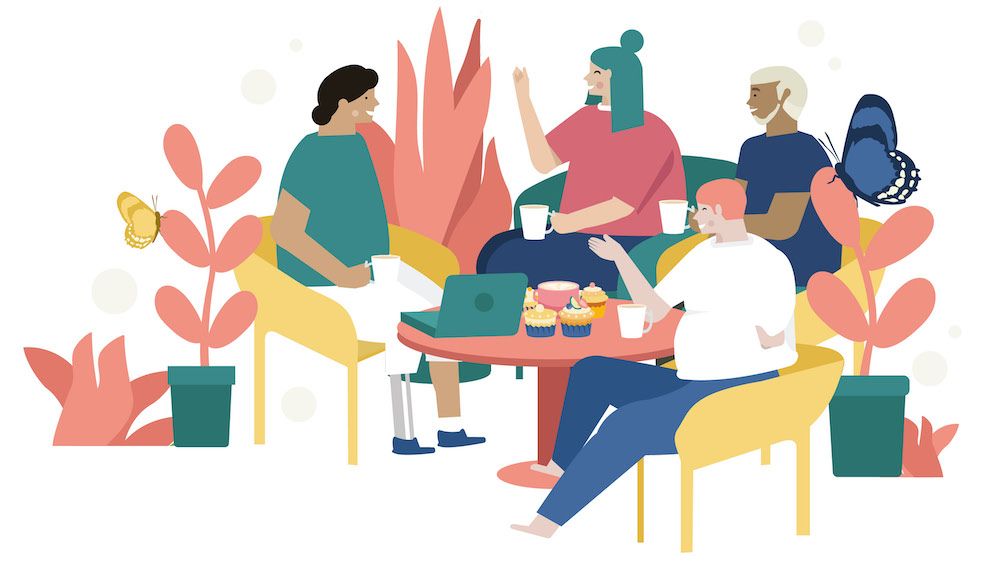5 things you should know about group therapy
updated on Sep 4, 2021

Could group therapy be right for you? Here’s what really goes on during sessions
Doing what it says on the tin, group therapy is a psychological therapy that takes place in a group setting, rather than one-to-one. Available on the NHS and privately, these sessions bring together people with similar problems, to create a supportive, inclusive environment.
But what actually happens in them? Here, with the help of counsellor Nicola Ockwell, we explore five key questions about group therapy.
What happens during a session?
Though each group will vary slightly, they tend to have between five and 15 members, and last for about an hour once a week.
“There are many different types of group therapy that target specific problems – such as anger, anxiety, addiction, depression, and bereavement to name a few,” Nicola explains. “They can be, but not always, run by qualified therapists, so the therapist or facilitator can support the group, as well as the group supporting each other – with the group becoming their own therapists, in a way.”
Nicola explains that most sessions will start with a ‘check-in’, and finish with a ‘check-out’, bringing together everyone’s thoughts for the day – and it’s common for the group to agree a contract, e.g. approaching sessions with openness and honesty.

Why do people attend?
People attend therapy for a plethora of reasons, but the key reason someone might choose to go to a group session is for the safe, unifying space where they can connect with others going through similar things.
“Using a collaborative approach is the ideal environment for working with CBT techniques such as worksheets, flip charts, and exercises to generate discussion,” Nicola says. “The activities will be designed to enable candidates to examine their current behaviour, so they can explore and contrast against each other.
“The group tends to be quite a cathartic space for all involved. Members encourage each other to share views constructively, which can be useful for anyone wanting to challenge or change their behaviour patterns.
“This also allows individuals to try different methods of communication, as well as experimenting with new skills and strategies already learnt in a safe, non-judgemental arena.”
Who goes to group therapy?
“Those who are ready to work on their particular issue, and are open to sharing their thoughts, and feelings within a group dynamic, will benefit from group therapy,” says Nicola. She highlights how group therapy may also be more accessible than one-to-one sessions, with many taking place in the evenings and being more affordable.
“Some people may find this form of therapy less daunting, as they are not alone and feel the support from group members,” Nicola continues. “It can be a great place to meet new people in similar circumstances, so it can be a safe environment where you can gain confidence in social situations, and also find validation in other’s perspectives.”
What are the challenges?
While there are plenty of benefits to attending group therapy, it’s also worth being aware of the unique challenges to decide if it’s the right option for you.
“This environment might be difficult if you have issues with speaking in front of people you don’t know well,” Nicola explains. “Sharing difficult emotions won’t be easy, but this improves as you start to know other group members better. No one should feel they have to speak if they don’t want to.”
Nicola also states that group therapy is not advisable for those who are suicidal, in crisis, or experiencing psychosis – as these conditions need professional help via a GP or psychiatrist.
What are the benefits?
“It’s a good place to get to know others and yourself, to try out different techniques with the group first, and then implement them into your world outside of the group,” Nicola says.
“It might be daunting initially, but the benefits can be fruitful and you might gain some friends as well! Group therapy can be as effective as individual therapy sessions, and can also provide a sense of belonging.”
If you struggle with feelings of isolation, this unique environment could be a good option for you. And beyond that, you could help someone else, too.
“Sharing experiences and listening to each other’s narrative can be beneficial, helping members to evaluate their own thoughts, feelings and behaviours, leading to greater self-development,” Nicola says. “This stimulating and challenging environment can be mutually beneficial, where new ideas and ways of being can be observed, as well as experimenting with new skills and strategies already learnt in a safe, non-judgemental arena – which can feel both rewarding and supportive.”
To connect with a counsellor like Nicola, or learn more about group therapy, visit counselling-directory.org.uk

